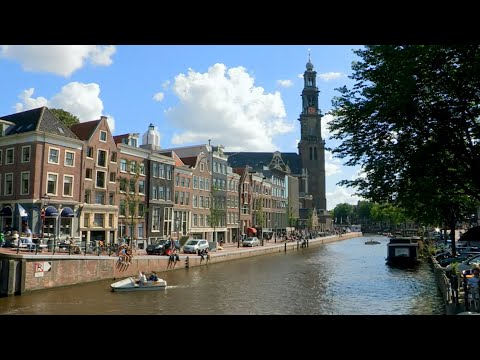
Amsterdam, the capital city of the Netherlands, is renowned for its artistic heritage, elaborate canal system, and narrow houses with gabled facades, legacies of the city’s 17th-century Golden Age. Its Museum District houses the Van Gogh Museum, works by Rembrandt and Vermeer at the Rijksmuseum, and modern art at the Stedelijk. Cycling is key to the city’s character, and there are numerous bike paths.
#### The Heart of Dutch Culture
In Amsterdam, culture and history collide with modern urban flair. The city has always been something of a connoisseur’s delight; whether it be art, architecture or culinary excellence. The Anne Frank House, where the Jewish diarist hid during WWII, offers a poignant glimpse into darker times while serving as an emblem of resilience. Meanwhile, the Museum District celebrates artistic achievement across centuries.
#### Canal Ring – Amsterdam’s Aquatic Arteries
The canals themselves are a major draw. Added to UNESCO’s World Heritage List in 2010, these waterways were once used for defense and transport in the 17th century but are now popular with tourists cruising on leisure boats to view stately merchant houses and colorful flower decked bridges from a unique angle.
#### A Cyclist’s Paradise
With over 400 km of bike lanes and more bicycles than people, cycling in Amsterdam isn’t just a mode of transportation; it’s a way of life. The flat landscape makes pedaling easy for visitors eager to explore far-flung neighborhoods such as Jordaan with its boutique shops and hip eateries or De Pijp bustling with street markets like Albert Cuypmarkt.
#### Culinary Delights
Dutch cuisine may not hold the global stature of some others but still offers distinct flavors especially evident in local street foods such as herring or kroketten (croquettes). For those with adventurous palates, numerous Michelin starred restaurants showcase both international fare and new Dutch cuisine which blends traditional ingredients into innovative dishes.
#### Nightlife & Festivals
Nightlife in Amsterdam caters to all tastes ranging from brown cafes (traditional Dutch pubs) that have been serving local brews since centuries to ultra-modern nightclubs where world-class DJs spin house music until dawn. The city also hosts several high-profile festivals including King’s Day — arguably Europe’s largest street party —and dozens more that celebrate everything from film to flowers.
#### Liberal Attitudes & Progressive Policies
Amsterdam is famed for its liberal policies towards cannabis consumption in coffee shops and pragmatic harm reduction approaches towards more serious drugs. Red Light District also exemplifies Amsterdam’s pragmatic approach towards prostitution ensuring safety for workers while being open about it thereby reducing stigma.
#### Environmental Initiatives
Recognizing global environmental challenges early on has allowed Amsterdam to integrate sustainability into its urban fabric like few other cities have managed. Innovations range from extensive public transport networks to ambitious ‘circular economy’ initiatives aiming at zero waste by reusing materials wherever possible.
#### Conclusion
Amsterdam remains one of Europe’s most enchanting destinations – a place where history resonates through winding cobbled streets even as cutting-edge architecture dots its skyline demonstrating a keen eye towards future developments without forsaking its past. Whether you’re soaking up culture or enjoying vibrant nightlife; indulging in haute cuisine or pedaling leisurely along tranquil canals; visiting this Dutch metropolis promises an array of experiences fit for every traveler.
